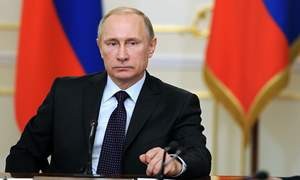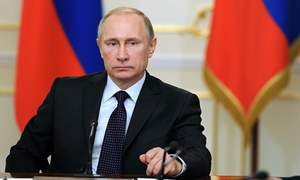New York Times
ANATOL LIEVEN
 If you believe many of the commentators and policy makers in Washington, President Vladimir V. Putin of Russia is an expansionist on the march. He’s had one great success after another: First, he annexed Crimea and fueled a destabilizing conflict in eastern Ukraine. Then he intervened in the Syrian civil war and rescued his client, the government of Bashar al-Assad, in its moment of need. Last month, Ashton B. Carter, the secretary of defense, indicated that he believed that Russia is the world’s greatest threat to American national security, ahead of a nuclear-armed North Korea and the jihadists of the Islamic State.
If you believe many of the commentators and policy makers in Washington, President Vladimir V. Putin of Russia is an expansionist on the march. He’s had one great success after another: First, he annexed Crimea and fueled a destabilizing conflict in eastern Ukraine. Then he intervened in the Syrian civil war and rescued his client, the government of Bashar al-Assad, in its moment of need. Last month, Ashton B. Carter, the secretary of defense, indicated that he believed that Russia is the world’s greatest threat to American national security, ahead of a nuclear-armed North Korea and the jihadists of the Islamic State.
This alarmism is counterproductive and largely wrong.
Three weeks into a partial truce, Russia has begun withdrawing most of its forces from Syria after Mr. Putin claimed that the military’s goals there had been achieved. In Ukraine, a cease-fire has been in place for over six months with few changes to the country’s situation. These realities underline the truth: Russia’s objectives are limited. The United States should recognize and accept this, and — while it may be hard for some in Washington to imagine — work with Moscow when interests overlap.
In Syria, Russia has had two linked aims: making sure that the Syrian regime survives in some form and ensuring that Russia will play a key part in whatever peace process eventually brings an end to the civil war. Washington has now been forced to accept these Russian positions.
Despite Russian air support, there was never a chance that the Assad regime would retake most of Syria from the rebels. It seems that Russia never intended for this, either. To help put the government in Damascus back in control of Idlib and Deraa, for example, Russia would have had to commit a huge, costly and dangerous infusion of forces over several years and risk provoking an even larger regional conflict. Instead, it seems Moscow just wanted to ensure that its ally in Damascus was not defeated by the rebels, many of whom are radical jihadists. The partial Russian military withdrawal at a time when the war has entered a tenuous cease-fire demonstrates the limits of Russia’s aims and Mr. Putin’s desire to work with — not against — the United States to achieve a settlement.
Russia’s military intervention in Syria has drawn criticism from international observers since many of its airstrikes seemed to target anti-Assad rebels rather than the Islamic State itself. But Seymour Hersh has reported, and my own sources have confirmed, that some figures in the Western military and intelligence communities see Russia’s strategy of fighting jihadism in Syria and keeping parts of the Assad government in power as the best course of action for now. These people are not serving Russian interests, but they have recognized that destroying the existing Syrian state could lead to handing the country over to terrorists.




